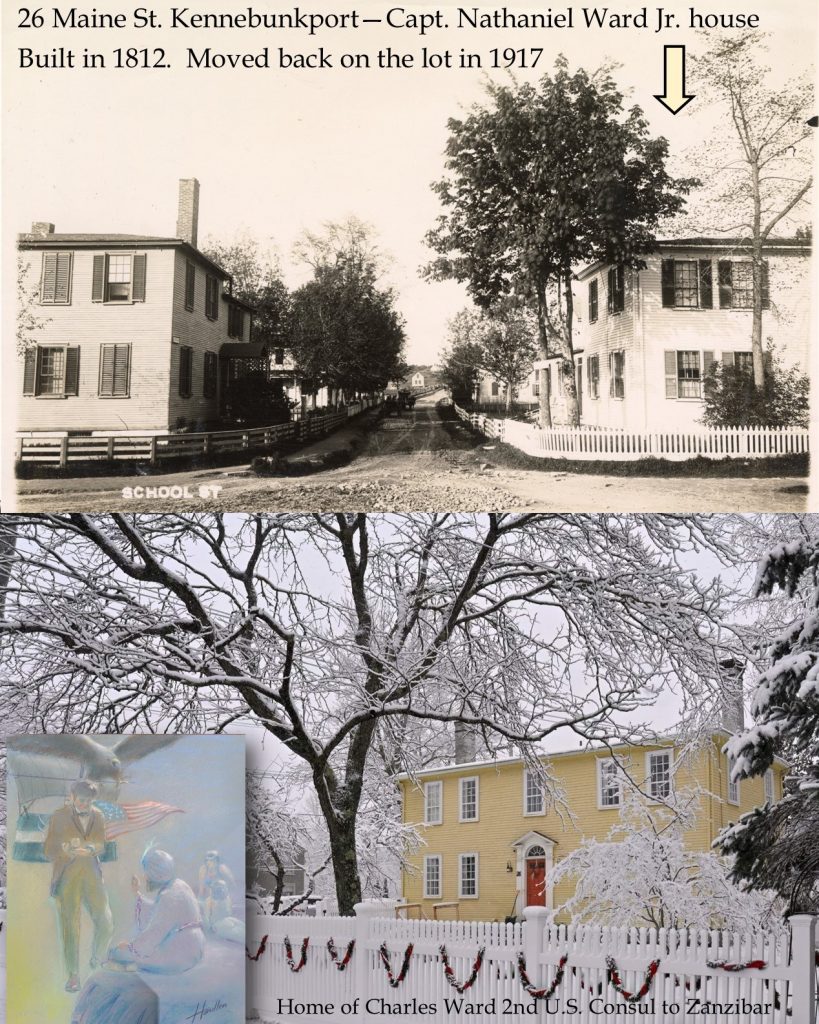Captain Nathaniel Ward Jr. House Kennebunkport
The house at 26 Maine St was built by boatbuilder and Sea Captain Nathaniel Ward Jr. in 1812. Nathaniel Ward Jr.’s eldest son, Charles, who inherited the house from his father, became the second American Consul to Zanzibar in 1846. Not the most diplomatic of diplomats, his explosive relationship with the Sultan Seyyid Said nearly ended United States Zanzibarian relationship with a bang.
The first United States Consul to Zanzibar was Richard P. Waters of Beverly, Massachusetts. He was horrified by the inhumane conditions suffered at the open slave market there but quickly learned that if he was to survive as a businessman in Zanzibar he would have to play by the Sultan’s rules, without regard to the British and American treaties forbidding the sale of human beings. Waters was recalled to Salem but was ordered to remain in Zanzibar until his successor, Charles Ward, arrived to assume the position.
Charles arrived at Zanzibar on January 20, 1846, and almost immediately posted a letter of complaint to Secretary of State, James Buchanan. Waters was already gone, he wrote, and all the files at the Consulate were missing. Most offensive of all was the deplorable condition of his American flags. Charles inquired in the letter whether he should pursue American Slavers. Buchanan’s answer was less than instructive. He would send new flags but it was up to Consul Ward to establish a friendly relationship with his hosts. Buchanan skirted the request for authority over American slave traders by referring Charles to the Consular handbook.
Slaves were illegal in Massachusetts and in Maine, but some New England merchants still contributed to the slave trade economy by renting their ships to Portuguese crews for the second leg of the triangle trade from Zanzibar to Brazil. Ward was also employed by Michael Shepherd of Salem Massachusetts, the principal of one of the most active American firms trading on the eastern coast of Africa. Charles found himself bound to protect Sherpherd’s interests and the interests of the United States.
During the 3 ½ years that he served as American Consul to Zanzibar, Ward bickered continuously with the Sultan, whose word of law changed with the wind. On July 4, 1850, the Sultan refused to allow a 21-gun salute honoring the American flag. Ward demanded a written apology and as usual, Seyyid Said laughed at the Consul’s demand. Ward was so incensed that he closed the consulate and sailed home for Salem. From his father’s Kennebunkport home at the corner of Maine Street and School Street the following March, he wrote a letter to the State Department recommending that a war ship be sent to Zanzibar to force the Sultan to give a formal apology or to suffer military consequence.
On December 2, 1851, the USS Susquehanna anchored at Zanzibar. Its commander, John Aulick, served up an ultimatum; He would bombard the town unless the required apology was made immediately. The sultan’s governor acquiesced, American honor was appeased, and the unfortunate affair was forgotten”.
There is some evidence that the house was at one time oriented facing School Street. When Artist Abbott Graves purchased the house, it was facing Maine St very close to the road. Graves moved it back in its present position in 1917.



Leave a Reply